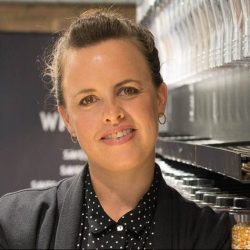Refill Revolutionary: Meet Catherine Conway

 If you’ve paid a visit to our St. Werburghs store lately then you might have seen the beginnings of a revolution happening on one of our walls… more than 40 organic products available to buy with no packaging at all. But as the wider world wakes up to the shocking problem of packaging waste, one woman has been battling on the frontline for years. Here we meet Catherine Conway, Zero Waste pioneer and founder of Unpackaged, the company behind our wonderful waste-free wall.
If you’ve paid a visit to our St. Werburghs store lately then you might have seen the beginnings of a revolution happening on one of our walls… more than 40 organic products available to buy with no packaging at all. But as the wider world wakes up to the shocking problem of packaging waste, one woman has been battling on the frontline for years. Here we meet Catherine Conway, Zero Waste pioneer and founder of Unpackaged, the company behind our wonderful waste-free wall.
Can you tell us a bit about the problem behind the Zero Waste movement?
Only 2% of plastic packaging is closed-loop recycled, which means that it’s turned back into the same product it started life as. The rest is sent to landfill, cascaded recycled (where plastic products are downgraded until they eventually become waste) or leaks into the environment. It’s a shocking waste of resources and money. It shows that the single-use system we rely on is fundamentally broken, and it’s our planet paying the ultimate price.
Zero Waste, as a consumer movement, was developed by individuals who wanted to show that you could make better choices. It’s based on following the 5 Rs: Refuse, Reduce, Reuse, Recycle and Rot – in that order! Most people think recycling is the answer, but there’s lots we can do before we even think about recycling.
What led you to set up Unpackaged? 
Quite simply because I wanted to refill! I used to go to a local health food shop to refill my washing detergent; it made perfect sense to me but I couldn’t do it for anything else I bought. At the time I was living in a flat in London that had mice, so I would always empty my dried goods into jars. I remember sitting there with all this packaging in my hands one day, thinking “this is nuts! I should be able to refill everything”. That was in 2005 when there just weren’t any shops that gave me what I wanted, so I had the hairbrained idea to open my own!
How have you seen people’s attitudes to packaging free shopping change since you first began?
There has been a slow general shift in consciousness happening as people gradually become aware of the problem of packaging. But suddenly everything changed when Blue Planet aired last Christmas—the issue finally became mainstream. This saw a 40% upturn in sales at one of our concessions in London and much more interest from other businesses, like Better Food, in implementing packaging-free shopping solutions. Consumer demand is allowing the retail industry to make really bold decisions in reducing packaging waste, and it’s such a pleasure for us to offer our experience to help other businesses make the change.
How do you see the Zero Waste movement developing in the next few years?
I think it’s just going to keep growing, because once you really understand the problem of packaging and waste, you can’t ‘un-see’ it, it’s everywhere and that realisation has the ability to really affect your purchasing habits. We need to see all sides working together to tackle the war on waste: more consumers demanding zero waste products and services, retailers and manufacturers responding by offering a wide range of packaging free options, and governments legislating to make it easier and more desirable for businesses and consumers to make the right choice.
Do you see your approach as revolutionary and innovative, or more of a return to traditional shopping methods?
I never thought what I was doing was revolutionary, as such—I definitely didn’t invent bulk selling! What I did do was link the problem of packaging with the solution of bulk shopping, and found a way to make it really attractive and easy for customers. I’ve always known that it has to be welcoming, and attractive, otherwise shoppers won’t want to change their habits. Shopping without packaging has to be a better alternative, whether it’s better value, better quality or better for your conscience. So I guess it is an innovative way to approach the experience of shopping, but whether it’s revolutionary or traditional, my mission remains the same: to encourage as many shops to do it as possible!
